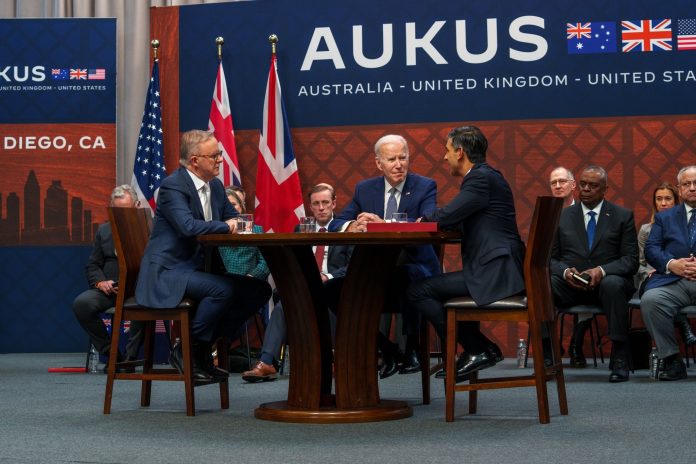Australian Prime Minister Anthony Albanese will visit Fiji on his way home from the United States, capping off a huge diplomatic offensive to calm regional concerns about the AUKUS security pact, and push back against a misinformation campaign by Australia’s detractors.
The Prime Minister, Foreign Minister Penny Wong, Defence Minister Richard Marles and Minister for the Pacific Pat Conroy have rung their regional counterparts in recent days while senior diplomats have also been put to work – in a sign of the sensitivities still being caused by Australia becoming just the seventh nation to operate nuclear-powered submarines.
In total, about 60 phone calls were made to ASEAN nations, Europeans, and five-eyes intelligence partners.
The Australian Financial Review has also been told that Chief of the Defence Force General Angus Campbell was dispatched to the region in the lead-up to the AUKUS announcement scheduled for Tuesday.
A government source confirmed General Campbell’s trip but would not name the countries.
With China claiming AUKUS – a tripartite security pact between Australia, the United Kingdon and the United States – was a “serious nuclear proliferation risk”, Albanese has been calling regional leaders, including Indonesian President Joko Widodo, to assure them otherwise.
He will keep up the diplomatic offensive on his way home when he meets Fiji Prime Minister Sitiveni Rabuka during a refuelling stop in the Pacific nation on Wednesday. He is expected to have a bilateral meeting with PM Rabuka at Blackrock in Nadi tomorrow afternoon to discuss the outcome of AUKUS pact PACNEWS has been told.
One source familiar with the efforts said it had been a “massive” exercise that was not just about diplomacy but countering the misinformation campaign, believed to be propagated by Beijing.
“We see that this is an investment in our capability. But at the same time, of course, we’re investing in our relationships in the region as well,” Albanese told British Prime Minister Rishi Sunak when they met in San Diego on Monday.
“And I’ve been talking with other leaders in the region, as well, explaining our position. And it’s been well-received and understood why we’re doing this.”
A government spokeswoman said, “in the lead-up to the announcement the government has been in contact with regional and international partners, building on work done since the election to re-engage”.
Today, Albanese, U.S President Joe Biden and British Prime Minister Rishi Sunak will jointly cement the AUKUS pact at a San Diego shipyard with the announcement of plans to enable Australia to acquire a fleet of nuclear submarines.
Under details already leaked, Australia will buy between three and five of the existing Virginia-class nuclear-powered submarines from the U.S as a stepping stone before eventually building submarines in Adelaide, based on a British design but with an American combat system and weapons and possibly a reactor.
As an interim measure, the U.S will begin forward-deploying nuclear submarines in Perth from 2027, allowing Australian sailors to work alongside and learn from American crews. That will require a significant expansion to the navy base in Perth.
To expand the industrial base to build and maintain submarines, thousands of workers will be sent to US and UK shipyards for on-the-job training, and they will then transfer those skills back to Australia.
The federal government estimates the AUKUS submarine venture will support about 20,000 direct jobs over the next 30 years across Australian industry, the Australian Defence Force and the Australian Public Service.
Conceived by former prime minister Scott Morrison, AUKUS will involve Australia operating nuclear-powered subs, but they will not be nuclear armed.
After details were leaked last week, China’s foreign ministry said the deal had been opposed by regional countries and the wider international community.
“This trilateral co-operation constitutes serious nuclear proliferation risks, undermines the international non-proliferation system, exacerbates arms race and hurts peace and stability in the Asia-Pacific,” a foreign ministry spokeswoman told a regular media briefing.
“We urge the U.S, the UK and Australia to abandon the Cold War mentality and zero-sum games, honour international obligations in good faith and do more things that are conducive to regional peace and stability.”
On Monday, Marles again played down such concerns, saying AUKUS should not hinder the thaw that has been occurring between Beijing and Canberra.
“This is about Australia being self-reliant in our defence. And as I said last week, this is ultimately about the collective security of our region,” he said.
“We value a productive relationship with China. We have worked very hard to stabilise our relationship with China, and we will continue to do that.
“But at the end of the day, this decision is really about Australia’s defence, and it is about Australia’s strategic intent. And that intent is to uphold the global rules-based order which has underpinned the prosperity, the stability and the incredible economic growth of East Asia.”
Shadow defence minister Andrew Hastie re-emphasised the Coalition’s support for the pact, saying the 20-plus-year project could not be seen through to fruition without such support.
“This is something that must be bipartisan, because we cannot fail,” he said.
“It’s really, really important that once we embark on AUKUS, that it is actually delivered on time.”
On Saturday, AFR Weekend reported Morrison saying the defence budget will have to rise from 2.1 percent of GDR to 2.5 percent to pay for AUKUS. This equates to about $9 billion (US$5.9 billion) a year extra in today’s dollars on defence and well over $200 billion (US$133 billion) over the next two-to-30 years.
Marles would not be drawn on the cost.
“In a rational world, defence spending is a function of strategic complexity and strategic threat. We are rational people,” he said.
“As a result, we are going to need to make sure that we have the disparate defence spend, which allows for the security of our nation over the long term,” he said.
SOURCE: AFR/PACNEWS













